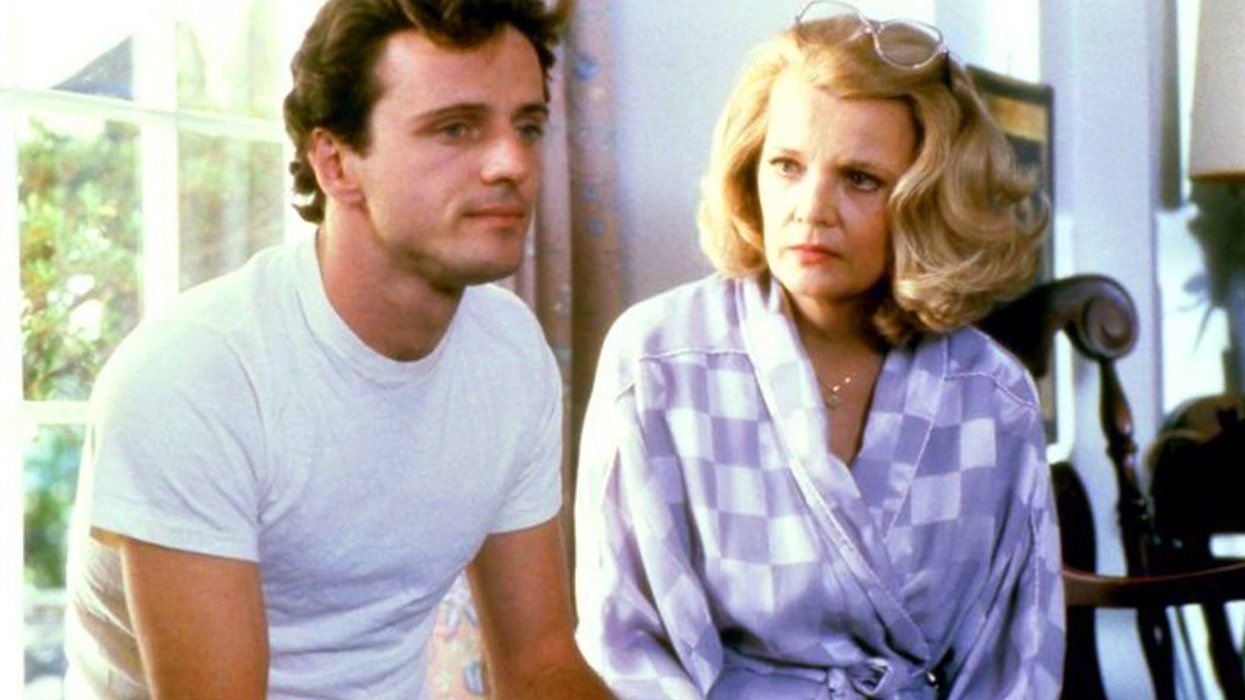I did not see An Early Frost when it first ran on NBC in November of 1985. I was in college and couldn’t risk watching a gay and AIDS film — especially since AIDS had lunged to the forefront of the news when Rock Hudson died in October of that year. I remember how cruel my college friends were to the memory of Hudson, and I shamefully went along with it.
I couldn’t risk being seen watching an AIDS film nearly 40 years ago, when I was 21. I’m not sure when I first saw it, but I clearly remember seeing the film, and it shook me. It still does.
Gena Rowlands, a Hollywood acting legend, died Wednesday at 94. She played the sympathetic mother to the main character, played by Aidan Quinn. Quinn’s character comes home to tell his family that he’s not only gay but he has AIDS.
It was groundbreaking television — tackling AIDS and homophobia. We wrote about the film on its 25th anniversary in 2010, As the article points out, in 1985, the AIDS epidemic was spreading rapidly, having claimed over 5,000 lives by that time. Despite growing awareness — 95 percent of Americans had heard of AIDS by June — many believed it only affected gay men.
If you were around during that time, you were also shaken by Hudson's death from AIDS complications. There were so many fears as a result. The mainstream media warned that the virus had entered the "general population." This messaging suggested that groups like hemophiliacs, people of color, sex workers, and gay men fell outside of this category, reinforcing damaging myths and misconceptions.
In the midst of this climate, NBC broadcast An Early Frost on November 11, 1985. The film follows Michael Pierson (Quinn), a successful Chicago lawyer who is diagnosed as HIV-positive and must reveal not only his illness but also his homosexuality to his family. As the family keeps him at arm's length, his mother, Katherine Pierson (Rowlands), eventually is the only one who shows true compassion.
Despite lots of resistance from executives at the time, the film was shown, and succeeded, somewhat, in moving the public conversation on AIDS forward. It earned 14 Emmy nominations and delivered a powerful message of empathy. And I’ll never forget this tidbit — it aired on a Monday night, and it actually beat Monday Night Football, which was news in and of itself. I’m sure that was what I was watching, but 28 million people tuned into the film.
Rowlands's portrayal of a mother grappling with the shock, confusion, and emotional turmoil that accompanies her son’s diagnosis was both nuanced and deeply moving. There are several scenes where she cries, and it’s very difficult to watch and not cry with her. I’ve seen the film multiple times. And Rowlands’s death has made me want to watch it again.
Rowlands’s character went on a journey — from initial fear and denial to eventual acceptance and love. Because Rowlands was such an accomplished actress, her incredible performance went a long way in helping society better understand AIDS during a time when misinformation and stigma were rampant. And it showed you could show love to those who suffered from the disease.
At the time of the film’s release, Rowlands furthered her impact by participating in a public service announcement that aimed to dispel common misconceptions about AIDS. Her involvement in the PSA reinforced the film’s educational message and encouraged viewers to approach the epidemic with empathy and informed awareness rather than fear, making her a key figure in both the cultural and public health conversation surrounding AIDS.
That was during a time when few prominent figures were stepping forward. So someone of Rowlands's magnitude speaking out was, again, news in and of itself.
Of course, Rowlands went on to do more incredible things. I also remember her vividly playing former First Lady Betty Ford in another hit television movie. She deftly portrayed Ford’s battle with alcoholism. Rowlands won an Emmy for that.
And her role in The Notebook, playing an older woman who suffers from Alzheimer's, was legendary. Ironically and sadly, that’s how Rowlands died. She won an honorary Oscar in 2015 for her lifetime of work. She deserved it and then some.
Every time, after An Early Frost, I saw Gena Rowlands in a film, on a television show, or at an awards ceremony, I immediately thought of her in that epic AIDS film and how she showed a compassionate face to something that was so dreaded and feared.
Voices is dedicated to featuring a wide range of inspiring personal stories and impactful opinions from the LGBTQ+ community and its allies. Visit Advocate.com/submit to learn more about submission guidelines. Views expressed in Voices stories are those of the guest writers, columnists, and editors, and do not directly represent the views of The Advocate or our parent company, equalpride.





































































Charlie Kirk DID say stoning gay people was the 'perfect law' — and these other heinous quotes